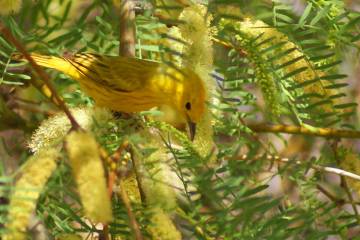Study: Las Vegas second worst for ragweed allergies
Tina Martinez sat in a treatment room of allergist Dr. Victor Cohen and learned that ragweed has a lot to do with her coughing, sneezing, watery eyes and lack of energy.
She also found out ragweed no doubt has played a role in her frequent bouts with hives and her onset of asthma two years ago.
"What we've found is that you're allergic to a lot of what's in the desert, including desert and western ragweed," Cohen told Martinez as they discussed her test results. "But I think we can start giving you some shots that will really help you with your immunity and make you more comfortable."
The scene that played out Tuesday in Cohen's medical offices near the corner of Eastern Avenue and Flamingo Road would seem to bolster findings of a national allergy study released this week. That report ranked Las Vegas as the second-worst city of 30 metropolitan areas in the United States -- behind only Phoenix -- for ragweed allergies.
But while Cohen, Las Vegas allergist Dr. Jim Christensen and University of Nevada School of Medicine professor Dr. Nevin Wilson say ragweed does affect a good number of Nevadans, they were critical of the study performed by Quest Diagnostics for not specifying whether those with heightened sensitivity developed the problem here or elsewhere.
The study is based on blood tests that measure sensitization to 11 common allergens.
"The blood test simply identifies that you've developed antibodies, had exposure to an allergen," Wilson said. "So many people who live in Las Vegas come from somewhere else where there is much more ragweed and they carry the antibody with them for years. The study doesn't say where people are getting exposed or whether they're actually allergic."
In the study, sensitization to common ragweed increased the most of the 11 common allergens evaluated over a four-year period, growing 15 percent nationally.
COMMON ALLERGENS
Sensitization to all 11 allergens increased by 5.8 percent. The common allergens tested included five foods -- egg white, milk, peanut, soybean and wheat. The other allergens were mold, two types of house dust mites, cats, dogs and ragweed.
The truth, said Christensen, is that Phoenix and Las Vegas are not places where there is a lot of ragweed compared to other areas of the country. Scientific journals point out that ragweed is most common in the East and Midwest.
"There needs to be a lot more study on this subject," said Christensen, who acknowledges that Las Vegas does have a "terrible problem with allergies, this spring in particular."
Although they question the completeness of the Quest study, the three practitioners believe that Southern Nevadans should be aware of the local problems with ragweed.
"When people finally come in here for allergies, they often just talk about grass or pollen from mulberry and olive trees," Cohen said. "You never really hear anybody talking about being allergic to what grows in the desert, like burrobrush."
Far too often, people try to manage allergies themselves, Cohen said, and they end up in trouble.
Martinez, for example, said she got a breathing machine and an inhaler to combat her problems.
"I'm hopeful after a about a year of shots she won't need that anymore," Cohen said,
The skin sensitivity tests Cohen gave Martinez have given him direction in developing allergy shots for her, he said.
A skin sensitivity test is often performed by applying an extract of an allergen to a person's skin, scratching or pricking the skin to allow exposure, and then evaluating the skin's reaction. It may also be done by injecting the allergen under the skin, or by applying it to a patch that is worn on the skin for a specified period of time.
Now, Cohen said, he can give Martinez a series of injections containing small amounts of the substances to which she is allergic to build up her immunity. After a course of shots, studies show that roughly 80 to 90 percent of patients have diminished symptoms. In many cases, their allergies disappear.
Cohen said medical practitioners try hard to educate the public about an important fact: some allergies can develop into asthma, a sometimes dangerous respiratory condition marked by spasms in the lungs that make it difficult to breathe.
"You can't just let it go," he said.
Martinez said she had sneezing and coughing symptoms for years before developing asthma. Since she came here in 1986, her allergies have become progressively worse, she said.
Studies show that allergies affect one in five Americans, accounting for more than 17 million physician office visits, 30,000 emergency room visits and several hundred deaths each year.
BLOOMING SEASONS
Dr. Stanley Naides, one of the physicians who did the study for Quest, said he believes the findings reinforce research that has found that a warming climate, which prolongs blooming seasons, may increase the abundance of allergens, including ragweed, in the environment. It also exposes people to allergens for a longer period of time.
"We do need to do more research on climate change," he said.
The two ragweed species most commonly found in Nevada are Ambrosia dumosa, also called desert ragweed, and Ambrosia eriocentra, also known as western ragweed.
Problems with local ragweed pollen are generally seen March through May, while the common ragweed found in the East and Midwest is most troublesome between August and the first frost.
"The one thing about ragweed pollen in Nevada is that it is blown all over by the wind," Wilson said. "It can go for miles and miles. It is much worse than back East."
The Asthma and Allergy Foundation of America has ranked Las Vegas as the 36th most challenging place to live in the United States "with spring allergies."
Over a four-day period in March, the website Pollen.com ranked Las Vegas the worst city for spring allergies because of the large amounts of mulberry, ash and juniper in the air.
Martinez doesn't really care about what studies have found about allergies in Las Vegas.
She said: "I just want some relief."
Contact reporter Paul Harasim at pharasim@reviewjournal.com or 702-387-2908.





























